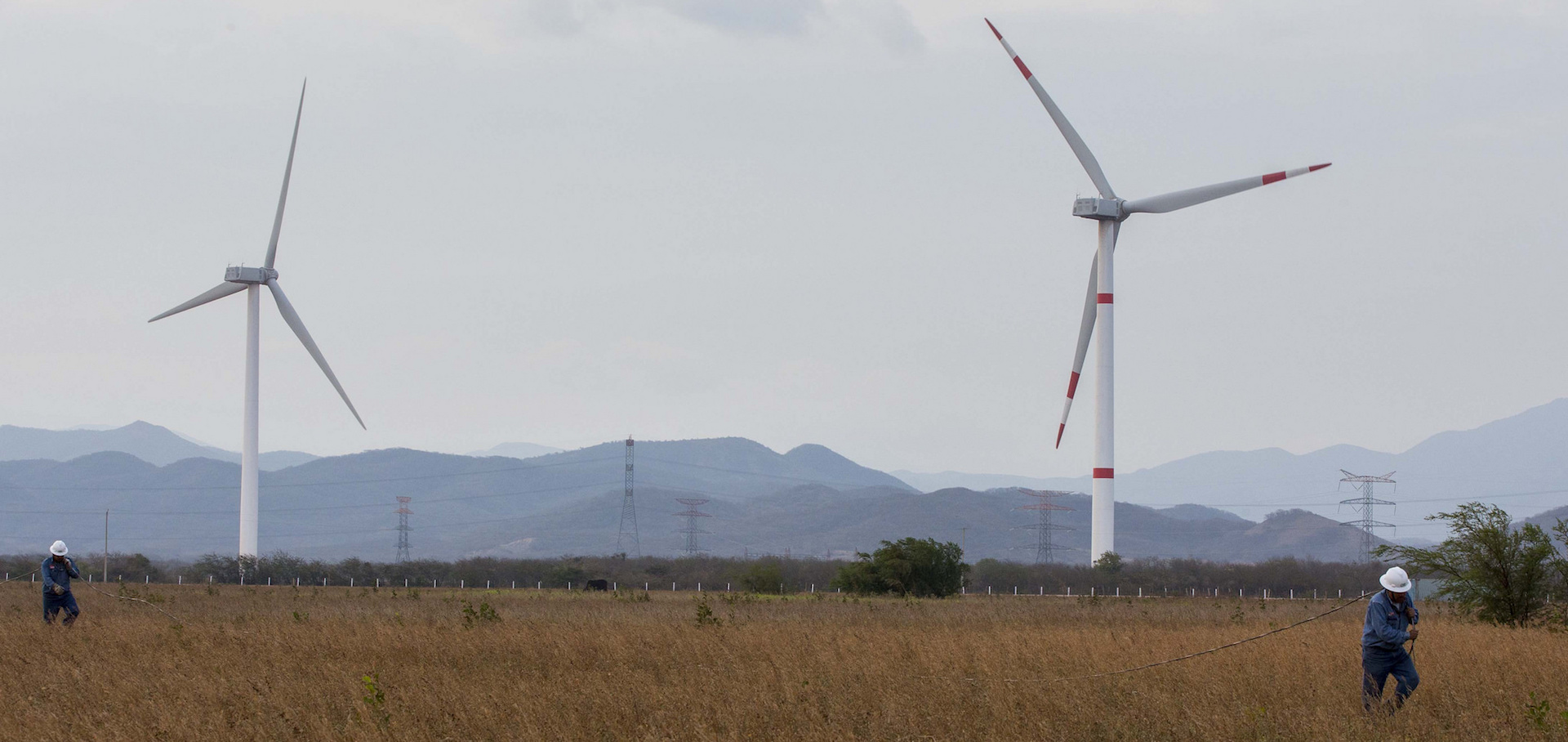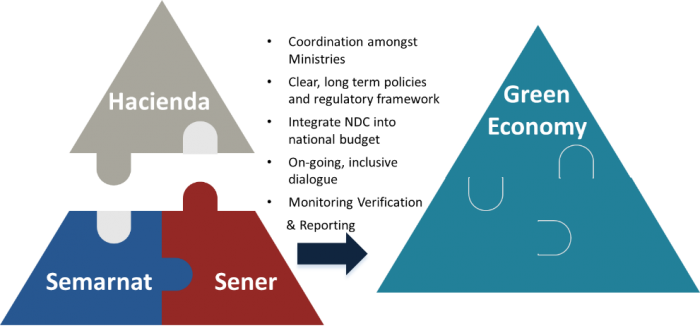Mexico has some of the world’s most favorable conditions for the transition to renewable energy. And yet it is struggling with a lack of commitment from policymakers, without whom it can’t be a world leader in the low-carbon economy. Dileimy Orozco takes a look the political puzzle.

Tehuantepec is the region of with the greatest potential to generate wind energy in Mexico (Photo by Presidencia de la República Mexicana, edited, CC BY 2.0)
Mexico is arguably the poster child for Latin American action on tackling climate change. However, to date the buy in across the political spectrum in Mexico has been selective, with SEMARNAT (Ministry of Environment) and SENER (Ministry of Energy) being the principle contributors to climate change action.
Now that Mexico has made a commitment to the low carbon transition in its National Determined Contribution and Sustainable Development Goals, a proactive engagement from the Ministry of Finance (Hacienda) is the missing piece of the puzzle. Hacienda’s lack of engagement is holding up the country’s efforts to achieve the green economy. Without this, Mexico’s position as a Latin American leader in addressing climate change is under threat.

Shifting Hacienda’s perception of climate action as a cost, rather than as an opportunity [1], is necessary both to enable the transition and to reap its economic benefits. Leveraging the financial sector could relieve the burden on the public purse. Beyond this, innovative and well-executed policy reforms to encourage low carbon finance can both boost the country’s economic competitiveness and position it as a leader for green technology [2].
An example of Hacienda’s inaction is Mexico’s Climate Change Act (CCA). The CCA created the Climate Change Fund in 2013 to pool all the funds made available by the government, the private sector and international donors for climate protection. However, the current system prevents international donors providing donations directly to the Climate Change Fund. Furthermore, it was thought that revenues raised through the introduction of the national carbon tax in 2014 could be earmarked to support delivery of the ambition embodied in the CCA. However, in reality these revenues, as well as international donations, have been lost within the Ministry of Finance’s general budget pool. Over the last four years the Fund had only received US$ 10 million, making the creation of the Climate Change Fund only a token gesture to appease the international community.
The unpredictable funding combined with the political uncertainty disincentives ambitious and innovative low carbon schemes. Lack of progress on turning policies into infrastructure – currently reliant on the pet projects of individual politicians and policy makers – is also hindering wider buy in for strengthened climate action.
These problems could be debilitating to Mexico’s low carbon transition in 2018 for two reasons. Firstly the July election engenders a greater degree of policy uncertainty; second and more importantly 2018 represents a key year under the Paris Agreement marking the point at which countries begin to assess their progress towards their NDCs. Sustained funding and clear policy commitments are critical as greening the economy and making the transition cannot be done in a single leap.
Setting aside the possible economic benefits, addressing climate change is a must for Mexico. Its agricultural sector is extremely vulnerable to droughts, whilst its industry and residential populations are also threatened by extreme weather, water shortages, earthquakes and hurricanes. Mexico stands to suffer significant economic costs if it cannot realign its political economy to address climate change head on. Mexico City is sinking because of rapid unplanned urbanisation and climate change.
Mexico should put its money where its mouth is
Mexico should look to what other countries in the G20 are doing to ensure it maintains its climate leadership in Latin America. Above all, Mexico needs to develop a clear strategy to unlock the finance needed for the low carbon transition, which would also ensure all stakeholders in the economy – including industry, the financial sector, civil society, and policy makers – are engaged. The UK’s Green Finance Task Force (GFT) serves as good example of how to achieve this.
The GFT, right from its inception, has gone out of its way to involve a wide range of stakeholders in a process which aims to come up with proposals on how to increase investment in the low carbon economy. Critically, this is a joint initiative between those responsible for key financial decisions (HM Treasury) and those overseeing business, energy, industrial and environmental policies (BEIS). The Taskforce uses a holistic and multi-partner approach because the barriers to achieving the low carbon transition are not clear cut, and without the engagement of all stakeholders devising a path to a low carbon future would not be possible.
Mexico already possesses several of the integral elements required for a low carbon transition. Much of the policy framework is in place, it has the technical and manufacturing capacity to take advantage of the transition, and it also has some of the most favourable geography and climate conditions for low carbon energy. The key factor holding up the low carbon transition is the lack of commitment from Hacienda and policy makers; the missing piece of the puzzle for kick-starting a green economy. With that commitment, Mexico could be a world leader in the low carbon economy.
[1] The global transition is estimated to be worth tens of trillions of dollars over the coming decades
[2] Mexico’s renewable energy sector has already been ranked as the second most attractive in Latin America for investment, and ninth most attractive globally.
This article was originally published at E3G.
Dileimy Orozco is a Senior Researcher in the International Climate Finance team at E3G, focussed on promoting public policy innovation to accelerate the low carbon transition. Her current areas of work include Institutional Innovation in Mexico, supporting the UK’s Green Finance Taskforce, and evaluating the alignment of International Financial Institutions with the Paris Agreement.